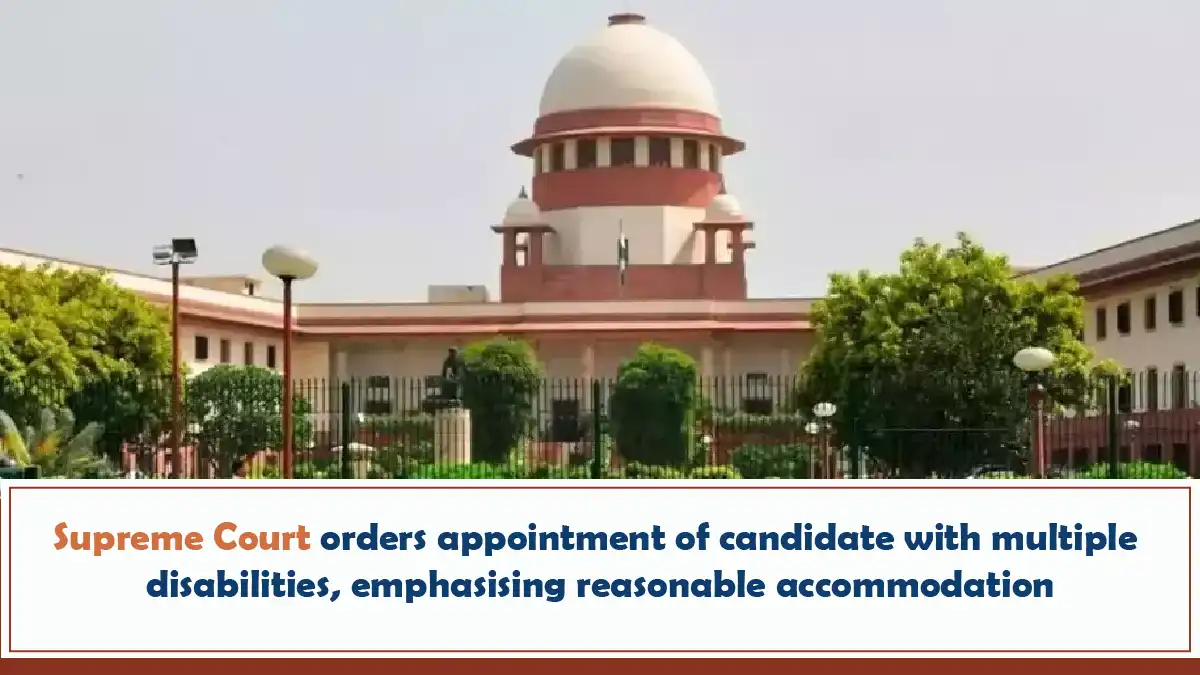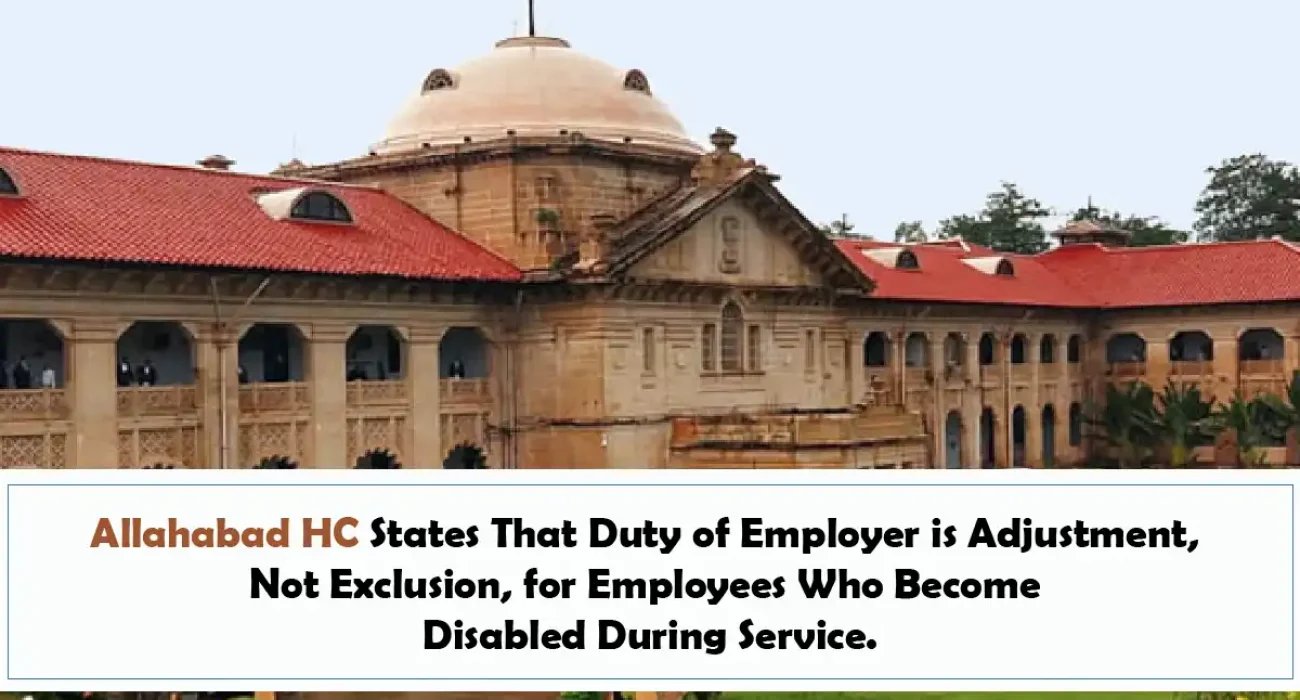

Table of Contents
ToggleThe petitioner was appointed as an Assistant Teacher in 2013 under the Basic Education Department in Barabanki district. On 2 August 2016, he suffered a severe brain stroke that rendered him unable to perform his teaching duties. After recovering partially, he submitted a joining request on 20 August 2024, but the authorities refused to allow him to resume service. The respondents constituted a committee to assess his fitness for duty, which, by its report dated 9 October 2024, concluded that the petitioner was incapable of performing teaching work since he could neither write nor speak. Consequently, he was not permitted to join.
The petitioner then approached the Allahabad High Court under Article 226 of the Constitution, seeking a direction to the respondents to consider him for appointment on an equivalent post, invoking the protection available under The Persons with Disabilities (Equal Opportunities, Protection of Rights and Full Participation) Act, 1995 and The Rights of Persons with Disabilities Act, 2016. He also sought regularization of his absence as medical leave and payment of salary arrears.
The petitioner’s counsel argued that once a government employee acquires a disability during service, his services cannot be terminated or reduced in rank. Relying on Section 20(4) of the Rights of Persons with Disabilities Act, 2016, counsel submitted that “if an employee after acquiring disability is not suitable for the post he was holding, he shall be shifted to some other post with the same pay scale and benefits.” The petitioner contended that the respondents had acted in clear violation of this statutory mandate by denying him reinstatement or any alternative posting.
He further relied on the recent Supreme Court judgment in Ch. Joseph v. The Telangana State Road Transport Corporation & Ors, where the apex court had emphasized that an employee acquiring disability during service must not be excluded from employment but accommodated suitably. It was submitted that Section 47 of the 1995 Act and Section 20(4) of the 2016 Act are pari materia, and thus the same principle of protection applies. The petitioner prayed that he be considered for redeployment to a suitable post with full pay and benefits, and that the intervening period from 1 October 2021 to the date of the order be treated as medical leave with salary.
The respondents, represented by the Additional Chief Standing Counsel, contended that the petitioner had remained absent from duty since 1 October 2021 and had submitted his representation for reinstatement only on 30 August 2024, after an unexplained gap of three years. The authorities, therefore, rejected his request on the ground of prolonged absence.
Further, based on the committee’s report dated 9 October 2024, it was asserted that the petitioner was medically unfit for any teaching work, being unable to speak, read, or write. Consequently, the respondents argued that he could not be permitted to join as an Assistant Teacher. It was submitted that his case had already been examined by a committee, which included a senior physician nominated by the Chief Medical Officer, and therefore no further medical evaluation was necessary.
Justice Abdul Moin of the Allahabad High Court examined the record and noted that while the petitioner had submitted medical documents showing he had suffered a brain stroke, “no medical board has been constituted by the respondents to examine the petitioner.” The Court found that the authorities had failed to properly assess the petitioner’s medical condition as required by law.
Referring to Section 20 of the Rights of Persons with Disabilities Act, 2016, the Court reproduced the relevant provision, emphasizing that “no Government establishment shall dispense with or reduce in rank, an employee who acquires a disability during his or her service.” The Court reiterated that as per the proviso, “if an employee after acquiring disability is not suitable for the post he was holding, he shall be shifted to some other post with the same pay scale and service benefits,” and the second proviso requires that “if it is not possible to adjust the employee against any post, he may be kept on a supernumerary post until a suitable post is available or he attains the age of superannuation, whichever is earlier.”
Justice Moin further observed that “from perusal of the provisions of the Act, 2016, it is apparent that where an employee acquires a disability during his service, his services are not to be dispensed with rather efforts are to be made by the employer for shifting him to a suitable post and in the absence thereto, to continue him on supernumerary post until a suitable post is available.”
The Court drew extensively from the Supreme Court’s judgment in Ch. Joseph (supra), quoting the principle that “when a disability is acquired in the course of service, the legal framework must respond not with exclusion but with adjustment. The duty of a public employer is not merely to discharge functionaries, but to preserve human potential where it continues to exist. The law does not permit the severance of service by the stroke of a medical certificate without first exhausting the possibility of meaningful redeployment.”
The Court thus held that even though the committee had declared the petitioner unfit for teaching, the law required the respondents to identify an alternative post suitable for him. The failure to do so was contrary to both the statutory provisions and the principles of substantive equality and reasonable accommodation under the 2016 Act.
Allowing the writ petition in part, the Court issued a direction to the District Inspector of Schools, Barabanki, to act in accordance with Section 20 of the Rights of Persons with Disabilities Act, 2016 and the principles laid down in Ch. Joseph (supra). The Court directed that the authority must identify a suitable alternative post for the petitioner with the same pay scale and service benefits.
If it was not possible to adjust him on any post, he was to be continued on a supernumerary post until a suitable position becomes available or he attains the age of superannuation, whichever is earlier. The Court directed that this exercise must be completed within four weeks from the receipt of the certified copy of the order.
Additionally, it was directed that the benefits arising from the District Inspector of Schools’ order be accorded within six weeks thereafter, and the period of the petitioner’s absence till such adjustment or appointment was to be regularized as per applicable rules.
In conclusion, the Allahabad High Court reaffirmed the constitutional and statutory mandate of inclusivity, holding that “employees who acquire disabilities during service are entitled not to exclusion but to reasonable accommodation, alternative employment, or continuation on supernumerary posts.”
Written by Adv. Deeksha Rai
IAW resources
Browse our help directory